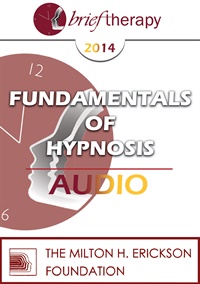
- Average Rating:
- Not yet rated
- Topic Areas:
- Hypnosis | Hypnotic Induction | Fundamentals of Hypnosis | Ericksonian Hypnosis and Therapy Techniques
- Categories:
- Brief Therapy Conference | Brief Therapy Conference 2014
- Faculty:
- Jeffrey Zeig, PhD
- Duration:
- 5:38:29
- Format:
- Audio Only
- Original Program Date:
- Dec 12, 2014
- Short Description:
- What is hypnosis? What is the Ericksonian difference? How do you help clients elicit a constructive trance experience? What is the most effective way to strengthen messages? In experiential workshop, participants will learn how to elicit a trance state and how to enhance responsiveness. Powerful hypnotic language forms can be tailored so that a trance is developed in an appropriate and efficient way for each client. Demonstration inductions, and work in small groups to induce and experience hypnotic states. Targeted to the beginner. No previous experience necessary. This is a one-day workshop and attendees are expected to attend all sessions.
- Price:
- $15.00 - Base Price
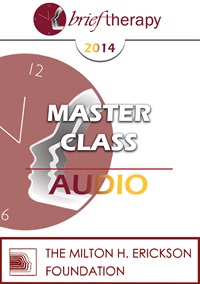
- Average Rating:
- Not yet rated
- Topic Areas:
- Ericksonian Psychotherapy | Master Classes | Brief Therapy | Ericksonian Hypnosis and Therapy Techniques | Experiential Therapy | Psychotherapy | Solution Oriented Approach
- Categories:
- Brief Therapy Conference | Brief Therapy Conference 2014 | Master Class
- Faculty:
- Jeffrey Zeig, PhD | Bill O'Hanlon, MS
- Duration:
- 5:51:06
- Format:
- Audio Only
- Original Program Date:
- Dec 15, 2014
- Short Description:
- Many schools of psychotherapy have been derived from the seminal work of Milton H Erickson M.D., including strategic therapy, interactional therapy, NLP and solution focused therapy. In some approaches hypnosis is central; in other approaches hypnosis is more peripheral. This class features two experts personally trained by Dr. Erickson, each of whom approach psychotherapy from somewhat different perspectives. In his approach, Possibility Therapy, Bill O'Hanlon epitomizes the strengths of a solution focused orientation. In his experiential approach, Jeffrey Zeig shades treatment in the direction of developing dramatic reference experiences.
- Price:
- $15.00 - Base Price
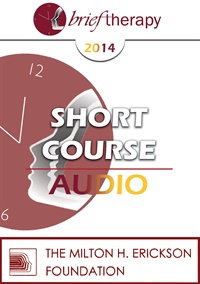
- Average Rating:
- Not yet rated
- Topic Areas:
- Ericksonian Psychotherapy | Psychotherapy | Trauma | Short Courses | Children and Adolescent Therapy | Pain and Healing | Brief Therapy | Ericksonian Hypnosis and Therapy Techniques
- Categories:
- Brief Therapy Conference | Brief Therapy Conference 2014
- Faculty:
- Maria Escalante de Smith, MA
- Duration:
- 1:09:29
- Format:
- Audio Only
- Original Program Date:
- Dec 11, 2014
- Short Description:
- When children experience painful emotions and anxiety after going through traumatic events they may not be able to understand what is happening to them and thus get depressed. Other consequences may appear, like lack of concentration or academic problems. Attendants will learn how treat these conditions by using brief Ericksonian techniques, assignments, and toys and by including the family members during therapy.
- Price:
- $15.00 - Base Price
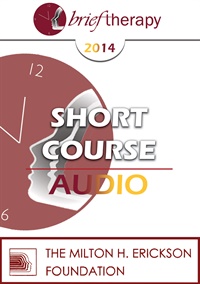
- Average Rating:
- Not yet rated
- Topic Areas:
- Short Courses | Somatic Experiences | Brief Therapy | Ericksonian Hypnosis and Therapy Techniques | Strategic Therapy
- Categories:
- Brief Therapy Conference | Brief Therapy Conference 2014
- Faculty:
- Hank Griffin, MA
- Duration:
- 1:30:29
- Format:
- Audio Only
- Original Program Date:
- Dec 11, 2014
- Short Description:
- Severe mental illness predominantly strikes the young, derailing normal social, cognitive and emotional development, predisposing to traumatic experience. Brief therapy interventions are particularly apt because they encourage skill acquisition and decontextualization via remedial experiential learning. This presentation will detail the use of strategic, somatic experiencing-influenced and Ericksonian interventions, among them pattern interruption, symptom prescription, ordeals and other Ericksonian elements treating chronically ill clients with attention to the structure and delivery of such interventions.
- Price:
- $15.00 - Base Price
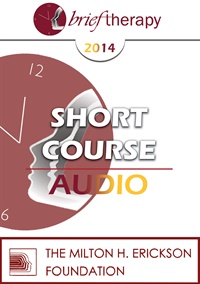
- Average Rating:
- Not yet rated
- Topic Areas:
- Short Courses | Hypnosis | Hypnotherapy | Self-Hypnosis | Ericksonian Hypnosis and Therapy Techniques | Anxiety | Depression | Post-Traumatic Stress Disorder (PTSD)
- Categories:
- Brief Therapy Conference | Brief Therapy Conference 2014
- Faculty:
- Paul Koeck, MD
- Duration:
- 1:37:58
- Format:
- Audio Only
- Original Program Date:
- Dec 11, 2014
- Short Description:
- Hypnotic Scaling is a simple Ericksonian & Solution Focused (self)hypnotic technique, developed by Paul Koeck, MD to help your client self-control and resolve Anxiety and Depression or symptoms of PTSD. You will be able to teach your client to freely choose where (s)he wants to be at a scale from 0 to 10 at any moment or in any context using (Self) Hypnotic Scaling. Your client will be able to choose his emotions, thoughts or feelings when and where (s)he wants!
- Price:
- $15.00 - Base Price
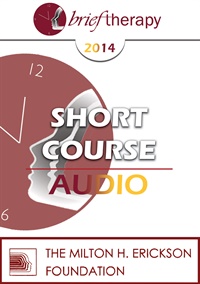
- Average Rating:
- Not yet rated
- Topic Areas:
- Trauma | Short Courses | Memory | Ericksonian Hypnosis and Therapy Techniques | Psychology
- Categories:
- Brief Therapy Conference | Brief Therapy Conference 2014
- Faculty:
- Dan Short, PhD
- Duration:
- 1:32:01
- Format:
- Audio Only
- Original Program Date:
- Dec 11, 2014
- Short Description:
- Ericksonian trauma work utilizes the experience of the present to redefine the past, while remaining future oriented. Memory reconsolidation occurs as memories are physically altered and re-encoded with new emotional elements. More than symptom relief, the intentional use of imagination and creative problem solving ensures greater resiliency for future challenges.
- Price:
- $15.00 - Base Price
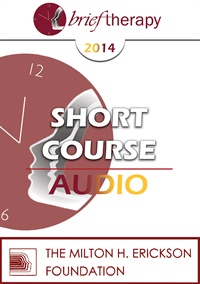
- Average Rating:
- Not yet rated
- Topic Areas:
- Anxiety | Depression | Trauma | Short Courses | Brief Therapy | Ericksonian Hypnosis and Therapy Techniques | Consciousness
- Categories:
- Brief Therapy Conference | Brief Therapy Conference 2014
- Faculty:
- Joseph Dowling, MS, LPC
- Duration:
- 1:27:36
- Format:
- Audio Only
- Original Program Date:
- Dec 11, 2014
- Short Description:
- Milton H. Erickson, M.D. understood that the conscious (thinking) mind is where symptoms are frequently created and cultivated while the subconscious mind is a limitless storehouse of healing energies, potentials, and solutions. This short course will describe a deceptively simple, Ericksonian approach to becoming powerfully calm. Live demonstrations, experiential zone exercises, and case studies will be facilitated to teach how solution-focused questions, strategic interventions, and formal/conversational hypnotherapy effectively treat anxiety, depression, and trauma.
- Price:
- $15.00 - Base Price
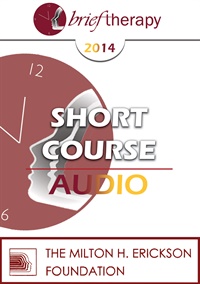
- Average Rating:
- Not yet rated
- Topic Areas:
- Anxiety | Depression | Trauma | Short Courses | Ericksonian Hypnosis and Therapy Techniques | Reality Therapy | Brief Therapy
- Categories:
- Brief Therapy Conference | Brief Therapy Conference 2014
- Faculty:
- Robert Wubbolding, EdD
- Duration:
- 1:29:28
- Format:
- Audio Only
- Original Program Date:
- Dec 11, 2014
- Short Description:
- A demonstration and a 12-minute DVD illustrate how to assist clients to make effective choices satisfying their needs, especially power or inner control. Merging reality therapy with Ericksonian principles helps clients discover and choose alternatives to the manifestations of past trauma, the pain of powerlessness due to anxiety and depression.
- Price:
- $15.00 - Base Price
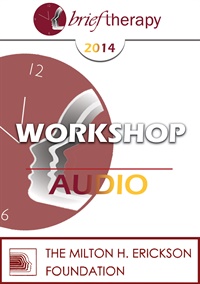
- Average Rating:
- Not yet rated
- Topic Areas:
- Anxiety | Depression | Trauma | Cognitive Behavior Therapy (CBT) | Hypnosis | Workshops | Ericksonian Hypnosis and Therapy Techniques | Milton Erickson | Brief Therapy | Naturalistic
- Categories:
- Brief Therapy Conference | Brief Therapy Conference 2014
- Faculty:
- Ernest Rossi, PhD | Kathryn Rossi, PhD | Roxanna Erickson Klein, RN, PhD, LPC, LCDC
- Duration:
- 1:59:16
- Format:
- Audio Only
- Original Program Date:
- Dec 12, 2014
- Short Description:
- Ernest Rossi, PhD, Roxanna Erickson-Klein and Kathryn Rossi review the case work of Milton H. Erickson, MD in counseling, psychotherapy, therapeutic hypnosis and rehabilitation as evidence-based cognitive behavior therapy to treat anxiety, depression and trauma. This experiential workshop explores the timeless nature of the work of Milton H. Erickson, who substantially influenced the manner that psychotherapy is practiced in the 21 century.
- Price:
- $15.00 - Base Price
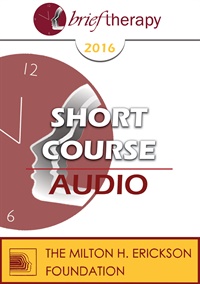
- Average Rating:
- Not yet rated
- Topic Areas:
- Short Courses | Utilization | Interviewing | Ericksonian Hypnosis and Therapy Techniques | Psychotherapy | Hypnosis
- Categories:
- Brief Therapy Conference | Brief Therapy Conference 2016
- Faculty:
- Brent Geary, PhD | Claudia Weinspach, Dipl. Psych
- Duration:
- 1:21:38
- Format:
- Audio Only
- Original Program Date:
- Dec 08, 2016
- Short Description:
- Milton Erickson’s counsel to “Take what the patient brings” encapsulated the utilization approach that he introduced in hypnosis and psychotherapy. This workshop is designed to enhance participants’ awareness of and ability to use the many facets of utilization that are elicited during clinical interviews. Two demonstrations will be included.
- Price:
- $15.00 - Base Price
Please wait ...

